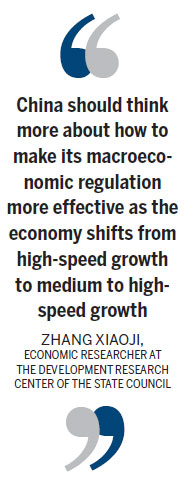China's new balancing act

The government's work report is emphasizing the need for stability as growth slows as the nation focuses on economic restructuring
China's leadership has highlighted the need for maintaining reasonable growth as a precondition for the new normal stage of economic development, as the government faces what is potentially the most critical period since the 2008 global financial crisis.
Given the increasing downward pressure, meeting the government's new growth target of 7 percent, compared with last year's target of 7.5 percent, may prove difficult to achieve. Official expectations for the inflation rate also retreated from 3.5 percent to 3 percent, indicating weak domestic demand.
| The busy Dalian Shipyard, one of China's major ship construction sites. Economists say the pace of China's GDP growth should decline, as a result of the painful transformation of the economic growth model. Provided to China Daily |
The government's annual work report signaled that macro policy could be more flexible this year to deal with an unexpectedly sharp deceleration in GDP growth, while structural reform should make marked progress and a bottom line established to avoid problems, especially in the labor market.
In late February, the People's Bank of China, the central bank, lowered the one-year lending and deposit interest rates by 25 basis points. The move came earlier than expected, and many observers had predicted the cuts would be announced after the release of the main economic indicators for February, when some analysts foresaw Q1 growth coming in under target.
The pace of GDP growth should decline, as a result of the painful transformation of the economic growth model, but there is still a limit, economists say. The NPC meeting centered on three main themes: supporting growth; risk reduction; and rebalancing. A number of analysts says a more specific reform agenda will be outlined after the conclusion of the two sessions.
Since the Party's Third Plenum in late 2013, notable progress has been made in key areas, such as reform of government administration and changes to budgetary and fiscal policy, prices, the financial sector and the social safety net.
Further liberalization
This year, China's policymakers will further liberalize deposit interest rates and implement a deposit insurance plan, roll out local government bond issuance, and deepen deregulation in the energy and environmental sectors and in utility pricing, according to experts.
"China should think more about how to make its macroeconomic regulation more effective as the economy shifts from high-speed growth to medium to high-speed growth", says Zhang Xiaoji, an economic researcher at the Development Research Center of the State Council and a member of the National Committee of the Chinese People's Political Consultative Conference.
"After monetary easing, will the capital flow into the real economy as the central bank expects? Policymakers must carefully examine how the existing interest-oriented mechanism of commercial banks will affect the flow of capital," he says. "I think reform of the banking system needs to be pushed further, because the banks still have features of the planned economy in terms of micro-management."
Yang Kaisheng, a former president of the Industrial and Commercial Bank of China and a member of the CPPCC National Committee, says: "As the Chinese economy has entered the new normal stage, commercial banks must accelerate their transformation and upgrading by restructuring their asset structure profit structure, and the regional layout of branches."
At present, credit assets are taking an increasingly smaller proportion of the banks' total assets, as a result of financial disintermediation, and profits from net interest margins will shrink further.

"Therefore, banks will make great efforts to develop their asset management business to compensate for the decline in net interest income, which may be an indication of the direction of transformation in the banking sector," Yang says.
According to Wang Tao, chief economist in China at UBS, the NPC may also review the much-anticipated comprehensive state-owned enterprise reform plan, which is scheduled for release at the conclusion of the two sessions.
"We expect the government to take a cautious approach with regard to large and centrally owned SOEs, focusing on improving the competitiveness and efficiency of SOEs' operations through the introduction of mixed ownership, improved corporate governance, and the implementation of state capital management."
Wang Junjin, chairman of the Shanghai-based JuneYao Group, says laws and regulations related to reform of the mixed-ownership policy should be improved to adapt to life under the new normal.
Some law and regulations are outdated, such as those requiring state-owned companies to hold a majority stake in joint ventures, says Wang, who is also one of the leaders of a team preparing for Shanghai's first private bank, Huarui Bank, as China gradually opens up the state-dominated banking industry.
China regards the reform of the SOE mixed-ownership policy and the invigoration of failing enterprises as a significant part of its economic restructuring program.
Thousands of SOEs form the backbone of China's economic growth, but the monopolies they hold in a number of key fields shut out smaller market entities and lead to low levels of efficiency and poor service.
The key to mixed-ownership reform, Wang says, is greater innovation, adding there is nothing to fear when a market-oriented system grows enterprises and maintains or adds to the value of state-owned assets.
The government's SOE restructuring plan is likely to be released after the two sessions. Key measures are likely to include the introduction of mixed ownership by attracting investors from the private sector and from overseas, restructuring and merging SOEs, and many more companies listing on the stock markets, according to Economic Information Daily.
The overhaul of previously resource-heavy SOEs would generate huge power for both the national and private economies, Wang says.
Jiang Xueqing and Zhao Shengnan contributed to this story.
chenjia@chinadaily.com.cn
(China Daily European Weekly 03/13/2015 page21)
Today's Top News
- Japan tempting fate if it interferes in the situation of Taiwan Strait
- Stable trade ties benefit China, US
- Experts advocate increasing scope of BRI to include soft power sectors
- New engine powers cargo drone expansion
- China to boost green industry cooperation
- Manufacturing PMI rises in November































